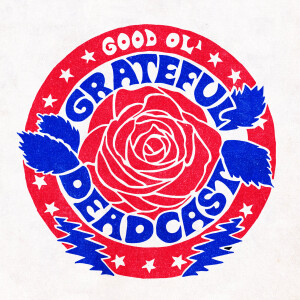

Episode List

Episode 149: Conor Friedersdorf / Jimmy Buffett
Scot and Jeff discuss Jimmy Buffett with Conor Friedersdorf.Introducing the Band:Your hosts Scot Bertram (@ScotBertram) and Jeff Blehar (@EsotericCD) are with guest Conor Friedersdorf. Conor is a staff writer atThe Atlantic, where he writes about politics and culture, with a focus on civil liberties, and he's the founding editor ofThe Best of Journalism, a newsletter on Substack where he highlights the best nonfiction that he encounters each week. Find him on X at @conor64.Conor’s Music Pick: Jimmy BuffettWhether you’ve had your fins up since the ’70s or just wandered in from Margaritaville wondering what the fuss is all about, you’re in the right place. In this episode of Political Beats, we’re kicking back and diving deep into the life and music of Jimmy Buffett — the man who turned tropical escapism into a full-blown philosophy and business model.Buffett’s career didn’t start with frozen cocktails and parrots on shoulders. He came up in the 1970s as a Gulf Coast troubadour, blending country, folk, and coastal storytelling into something all his own. His early albums like A White Sport Coat and a Pink Crustacean and A1A earned him a devoted following, while songs like “Come Monday” and “A Pirate Looks at Forty” showed a tender, reflective side behind the laid-back image.But then came “Margaritaville” — and everything changed. The 1977 hit launched Buffett into the stratosphere, spawning not only a signature sound but a full-fledged lifestyle brand. Over the next few decades, he built an empire: hit albums, bestselling books, restaurant chains, retirement communities, and legions of Parrotheads who came for the music and stayed for the state of mind.In this episode, we take a sunny stroll through his albums — highlighting the iconic tunes, the underrated gems, and the occasional head-scratcher (a decent portion of the 1980s). Whether you’re here for the deep cuts or just trying to figure out what the “Coconut Telegraph” actually is, we’ve got you covered. We try to unpack the stories, the sound, and the secret sauce that made Buffett not just a musician, but a lifestyle. And we attempt to answer the question: Did Buffett make a truly great album at any point or is the Greatest Hits collection all you really need?So pour yourself something cold, find a hammock — or a seat on the beach — and join us as we sail through the world of Jimmy Buffett: singer, storyteller, and the only guy to turn chill vibes into an empire.

Episode 148: David Lowery Interview
Your Political Beats hosts Scot Bertram (@ScotBertram) and Jeff Blehar (@EsotericCD) get the opportunity to spend a little more time with singer/songwriter/bandleader/advocate/professor David Lowery (@DavidCLowery)Now-frequent (two times is frequent, right?) Political Beats guest David Lowery returns to the show to talk about his magnificent new solo record Fathers, Sons and Brothers.For those unaware, David is the founder of Camper Van Beethoven and Cracker as well as a long-time advocate for artists' rights. He also serves as Senior Lecturer in Music Business at the Terry College of Business at the University of Georgia. David previously joined us for more than three hours to discuss the music created by both of his bands -- the original version is here and the remastered version (higher audio quality and additional song clips) is right here -- so we don't spend time at all reviewing that content. The new album is good enough that it deserves its own place in the sun.As David himself describes Fathers, Sons and Brothers, "In lieu of an uninteresting written autobiography I’ve made this record. I do this not so much to tell my own story but to pay tribute to my mother, father, sisters, extended family, friends, and those who have shared their lives with me." It tells the story of his life, career, and loved ones. The songs are deeply affecting and carry a somewhat unexpected emotional heft. The closing kick -- "Vending Machine," '"Fathers, Sons, and Brothers," "Yonder Distant Shore," "Darken Your Door," "Giving Tree Father" -- is just one gut punch after another when you realize the stories being told. It’s all just further evidence that Lowery is peerless among his generation's songwriters and deserves even more acclaim than he has received.During this conversation, we spend time trying to define the sound of the new record (we suggest an extension of Gram Parsons's "Cosmic American Music" idea), the backstories behind a few of the songs, how the album’s narrative took shape and propels the record forward, and where he finds his joy these days in performing live music. There's even a question about religion buried in here.If you love CVB, you'll love this album. If you love Cracker, you'll love this album. If you love Political Beats, well, we're pretty sure you'll love this album. Many of the songs are cinematic in their scope; you literally can picture these scenes playing out in your mind. These tracks are elevated by spending time with the lyric sheet and appreciating the nuances and care taken in the storytelling. Be sure to check out David and Cracker (full band and solo dates) live through the rest of the summer. He indicated a more extensive slate of dates supporting Fathers, Sons and Brothers could be on the way this fall. If you’re out and about, you might see Scot at any Detroit-area show and Jeff at any Chicago-area shows. These songs certainly deserve to be seen live.

Episode 147: Tim Constantine / Bob Seger
Scot and Jeff discuss Bob Seger with Tim Constantine.Introducing the Band:Your hosts Scot Bertram (@ScotBertram) and Jeff Blehar (@EsotericCD) with guest Tim Constantine. Today you see him interviewing presidents and prime ministers on The Capitol Hill Show out of Washington, D.C., but Tim got his broadcasting start in rock radio when he was just 13 years old. Watch Tim Constantine's Capitol Hill Show and find him on X at @timconstantine1.Tim’s Music Pick: Bob SegerBursting out of the Detroit rock scene in the late ’60s, Bob Seger paid his dues in smoky bars and VFW halls before finally breaking through with Live Bullet and Night Moves. It wasn’t overnight success. Seger’s story begins in the early 1960s and includes a string of quality albums in the early 1970s that the artist refuses to allow to be streamed or rereleased in any way. Seger’s raspy voice and working-class storytelling made him the unofficial bard of the Midwest — writing songs that felt like they were ripped straight from America's small town backroads and main streets. Seger had a gift for writing anthems that balanced nostalgia with grit, “Night Moves” and “Mainstreet” chief among them. He followed his smash hit album with a fish-out-of-water follow-up that spoke to some of his uncomfortableness with the spotlight. In the ’80s, Seger leaned into his role as rock’s reliable everyman. With songs like “Against the Wind” and “Like a Rock,” he became the (literal) soundtrack for Forrest Gump and the voice that sold millions of Chevy pick-up trucks. Whether it was a prom slow dance or a late-night drive, Seger’s songs were always there.His later albums didn’t necessarily chase relevance — they just kept the flame alive. And when he finally hung it up after one last tour in 2019, he didn’t exit with bombast and he hasn’t teased the world with any number of comebacks. He seems content to have left listeners with a jukebox full of songs to enjoy. And it’s likely you know far more of them than you might think.If you’re a fan of old time rock and roll, well, this might be the episode for you.

Episode 146: Jeff Pojanowski / Turnpike Troubadours
Introducing the Band:Your hosts Scot Bertram (@ScotBertram) and Jeff Blehar (@EsotericCD) are joined by guest Jeff Pojanowski. Jeff is a professor at Notre Dame Law School, where he teaches and writes about philosophy of law and legal interpretation. He also writes occasional columns for The Pillar. He has been living happily in Northern Indiana after escaping Washington, D.C., 15 years ago.Jeff’s Music Pick: Turnpike TroubadoursThis is a rarity for Political Beats, in which we present a show driven largely by our guest’s preferences. Jeff Pojanowski joined us previously for Pavement and Crowded House and by now we trust his musical judgement. For quite a while, he’s been selling us hard on taking up the career of Turnpike Troubadours for an episode. With the recent release of a new album, and additional endorsements of the band from others in our sphere, it seemed a good time to take him up on the offer.We’re awfully glad we did.The Turnpike Troubadours, hailing from Oklahoma, have become one of the leading purveyors of Red Dirt country music, featuring songs that are masterclasses in storytelling, instrumentation, and authenticity. Look, if you don’t like fiddle, you might be in the wrong place. Formed in 2005 by frontman Evan Felker and bassist R. C. Edwards, the band’s early years were shaped by relentless touring. The first album, Bossier City, is almost more a collection of demos. The group wasn’t quite fully formed yet. But on Diamonds & Gasoline (2010), everything began to click into place. As the band matured, their songwriting deepened without losing its raw immediacy. Albums like Goodbye Normal Street (2012) and The Turnpike Troubadours (2015) would be highlights of any band’s career. Felker’s songwriting stands out not just for its precision (though occasional lyrical duplicity can leave the listener wondering exactly what a song is about), but for its ability to evoke vivid rural landscapes. These are songs about places and towns that many Americans easily can picture in their mind. Musically, Kyle Nix’s fiddle and Ryan Engleman’s guitar work offered a dynamic counterpoint that always serves the song first.The band’s career wasn’t without turbulence, of course. After the 2017 release of A Long Way from Your Heart, the band entered a hiatus amid Felker’s battle with alcoholism. Fans cheered the band’s 2022 comeback, marked by the release of the Shooter Jennings-produced A Cat in the Rain. It’s impossible to listen to songs on the record without putting them in the context of Felker’s troubles. It’s an album that likely had to be made, however, to bring the band to 2025’s The Price of Admission, a release that all three of your hosts come to praise.There’s probably still a lot of music left in the tank for Turnpike Troubadours, and there’s no better time than now to jump on board to discover what you might have been missing.

Episode 145: Andrew Stuttaford / Brian Eno
Introducing the Band:Your hosts Scot Bertram (@ScotBertram) and Jeff Blehar (@EsotericCD) are joined by Andrew Stuttaford. Andrew needs little introduction as the editor of NR's Capital Matters. Find him online right here at National Review or at @AStuttaford on Twitter/X.Andrew’s Music Pick: Brian EnoHere he comes, the boy who tried to vanish to the future or the past. Yes, it's time for Political Beats to celebrate one of the most influential musicians in the history of modern recorded sound -- a man who, ironically enough, is at pains to characterize himself as a non-musician. Children of the Eighties and Nineties may primarily understand Brian Eno as the producer who took U2 to megastardom, but his work as a producer is properly only a footnote to his work as a songwriter and (most importantly of all) a conceptualist. Eno first achieved fame with Roxy Music as their "noise man," providing outrageous sounds alongside "treatments" -- electronic reprocessing -- of the rest of the group's instruments. But Roxy Music was ultimately pianist/vocalist Bryan Ferry's baby, and so Eno soon struck out on his own, for a solo career that would bring him into collaboration with some of the best and most innovative musicians of the Seventies as he put out a sequence of four "lyrical" albums which bent the definition of "popular music" well past its breaking point and into the avant-garde. At the same time, Eno was creating an entirely new genre of recorded sound: so-called "ambient" music, written and recorded in such a way as to (per his maxim) "reward your attention without demanding it."This, of course, is only the tip of the iceberg in a career that also includes brilliant songwriting collaborations with Robert Fripp, David Bowie, and Talking Heads among others. All of this and much more are discussed on a episode Political Beats has been waiting to do for eight years: Brian Eno played an enormous role in inventing the sonic world we still live in, and also made some of the most unexpectedly profound and beautiful music while doing so. We are lucky to be joined by NR's own Andrew Stuttaford for this episode, who lends particular credibility to the discussion as a fan from all the way back in 1972, during the Roxy years. Enjoy stepping into another (green) world.
You may also like
Create Your Podcast In Minutes
- Full-featured podcast site
- Unlimited storage and bandwidth
- Comprehensive podcast stats
- Distribute to Apple Podcasts, Spotify, and more
- Make money with your podcast












